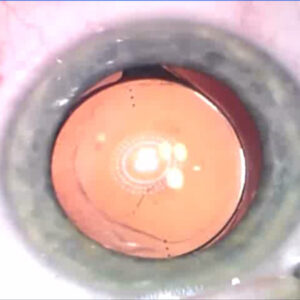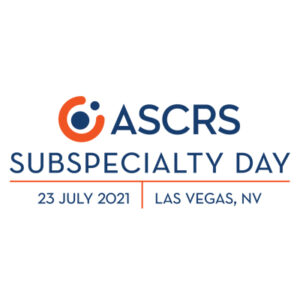Ophthalmology News
December 2007
by Vanessa Caceres
EyeWorld Contributing Editor
Steroids play a role for treatment in some patients
Patients with herpes simplex virus (HSV) keratitis can present some of the most challenging cases that eye surgeons treat, said Edward J. Holland, M.D., Cincinnati Eye Institute, University of Cincinnati.
Once they delineate the type of HSV keratitis the patient has, clinicians must decide on the most effective use of antiviral medications. This may mean a choice of oral versus topical antiviral medications, combining antivirals with corticosteroids when appropriate, and prescribing antiviral medications as prophylaxis indefinitely or before surgery.
Although some clinicians have clear guidelines as to when to use antiviral or steroid treatment and what type of antiviral or steroid treatment they will use, others still struggle to manage this, said James Chodosh, M.D., professor, Department of Ophthalmology, University of Oklahoma Health Sciences Center, Oklahoma City.
Here are some pros and cons on the use of oral versus topical antivirals for treatment or prophylaxis in patients with HSV keratitis—and when it is appropriate to administer corticosteroids.
Topical versus oral
A patient with HSV on the eyelids or in the cornea in the United States will commonly receive the eye drop Viroptic (trifluridine ophthalmic solution, King Pharmaceuticals, Bristol, Tenn.) five to nine times a day for one or two weeks, said Christopher J. Rapuano, M.D., professor of ophthalmology, Jefferson Medical College of Thomas Jefferson University, and co-director, Cornea Service, Wills Eye Institute, Philadelphia. Internationally, a topical form of acyclovir (Zovirax, GlaxoSmithKline, Middlesex, United Kingdom) is available, said Dr. Holland.
However, physicians may also choose to use an oral antiviral medication, such as acyclovir 800 mg five times a day, 1 g of Valtrex (valacyclovir, GlaxoSmithKline) three times a day, or 500 mg of Famvir (famciclovir, Novartis, East Hanover, N.J.) three times a day, Dr. Rapuano said. The oral treatment is usually taken for seven to 10 days. “Sometimes we treat with the drops and not the pills. Other times we treat with both to blast it,” he said.
“My preference is the oral treatment,” said Francis S. Mah, M.D., co-medical director, Charles T. Campbell Ophthalmic Microbiology Laboratory, University of Pittsburgh School of Medicine. “It’s very safe, and compliance is easier with two to three times a day versus five to nine times a day [with drops].” Dr. Mah is more cautious with the use of oral antiviral treatment in pregnant or expectant mothers or in patients with kidney problems.
The topical treatment can lead to some scarring and nasolacrimal duct obstruction, more reasons that lead practitioners to favor the oral medications instead, Dr. Holland said.
Plus, the topical forms do not usually penetrate as well as the oral antivirals when treating endotheliitis, one form of HSV keratitis, Dr. Chodosh said.
In herpetic patients with infectious epithelial keratitis, Dr. Holland favors the use of topical and oral antiviral treatment along with debridement of the lesion.
“Treating the patients with antivirals as fast as we can and debriding all play a role in reducing the viral load to the stroma,” he said.
Corticosteroid treatment
Despite concerns about treating herpetic patients with corticosteroids, research shows that they are a helpful part of the surgeon’s armamentarium, Dr. Chodosh said.
“The Herpetic Eye Disease Study [HEDS] in the 1990s delineated a number of features that may have not reached clinical practice,” he said. This includes evidence to show that the benefits of corticosteroid treatment appear to outweigh any of their associated risks in these patients.
For example, a patient with HSV stromal keratitis may receive steroids to reduce inflammation and remain on oral antivirals while they are using the steroids, to help reduce the risk of recurrence potentially triggered by steroid use, Dr. Holland said.
“Clinicians are taught about the complications of steroids, such as cataract formation and IOP spikes,” Dr. Holland said. However, without steroid treatment, there’s a greater risk for corneal scarring. “I’d rather treat a cataract and IOP elevation than have a corneal scar because steroids were withheld or tapered too quckly,” he said. Dr. Holland recommends keeping patients on steroids at a level above their flare dose to help prevent HSV recurrences.
Dr. Mah also sees residents and community practitioners struggle with when to administer steroids in herpetic patients. “If you put steroids on a live virus, it’s like putting gasoline on a fire. It’ll spread more,” he said. “When we talk to primary care physicians, we tell them to be cautious with steroids in a red eye because it could make things worse.”
Still, Dr. Mah agreed with Dr. Holland that the careful use of steroids combined with oral antivirals is the best treatment course in patients with HSV stromal keratitis.
Preventing recurrences
Patients with certain types of HSV are prone to recurrences. Some research, such as that from the HEDS investigators, indicates a role for oral antivirals to prevent these recurrences.
“The more times you’ve had herpes, the greater chance you’ll get it again,” Dr. Rapuano said. “There’s good evidence from the HED study that shows oral antiviral pills, such as the use of long-term acyclovir, can significantly reduce the risk for recurrences.” The HEDS investigators found that long-term prophylaxis with oral antivirals can reduce recurrences by 50%.
Although Dr. Rapuano has prescribed oral antiviral prophylaxis in these patients for a few years, Dr. Chodosh said many practitioners do not do this yet.
A study published in the American Journal of Ophthalmology in 2006 that Dr. Rapuano co-authored found that antiviral prophylaxis decreased infectious episodes by 44% in nonatopic patients with HSV and by 76% in atopic patients.
“Antiviral prophylaxis for HSV recurrences was more effective in reducing infections in atopics and less effective in reducing inflammatory episodes in atopics versus nonatopics,” the investigators wrote.
Dr. Chodosh recommends long-term oral acyclovir for patients with 1) multiple occurrences of HSV that each require corticosteroids, 2) recurrent inflammation with scarring or neovascularization that approaches the visual axis, 3) more than one episode of necrotizing keratitis, or 4) a history of herpetic eye disease and a corneal transplant. “Outcomes are usually poor in those patients but with the use of acyclovir, the outcomes are excellent,” he said.
In patients with recurrent herpetic episodes, “I’ll tell them that it’s better that you stay on antivirals indefinitely, because the consequence of another infection is that you’ll lose the vision that we saved,” Dr. Mah said.
If patients with herpetic episodes must undergo eye surgery, Dr. Mah believes antiviral prophylaxis one day or a couple days before surgery, combined with post-op use for a couple of weeks, is another helpful measure.
“The trauma after surgery could cause an increase in the inflammatory response,” he said.
ARTICLE SIDEBAR
When to use steroids in patients with herpetic eye disease
- Are you treating live virus? If so, do not use steroids; only use antiviral medications
- Is there significant inflammation but no live virus? Use steroids combined with antiviral treatment.
- Can you use steroids in these patients for prophylaxis? Yes, if there is a significant risk for vision loss (such as central scarring?) or a history of recurrent episodes.
Source: Francis S. Mah, M.D.
Editors’ note
Dr. Holland has financial interests with Alcon (Fort Worth, Texas) and Allergan (Irvine, Calif.). Dr. Mah have financial interests with Alcon and Allergan. Dr. Rapuano has financial interests with Alcon, Allergan, and Inspire Pharmaceuticals (Durham, N.C.).
Contact Information
Chodosh: 405-271-1095, james_chodosh@ouhsc.edu
Holland: 859-331-9000, eholland@fuse.net
Mah: 412-647-2214, mahfs@upmc.edu
Rapuano: 215-928-3180, cjrapuano@willseye.org



